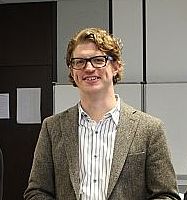91 - James Wilberding on Nature and Neoplatonism
James Wilberding joins Peter to show that contrary to what is often claimed, Neoplatonists did make contributions to the philosophy of nature. Topics include Plotinus on the cosmos and Porphyry on embryology.
Themes:
• J. Wilberding, "'Creeping Spatiality' in Plotinus," Phronesis 50 (2005), 315-34.
• J. Wilberding, Plotinus' Cosmology (Oxford: 2006).
• J. Wilberding, "Porphyry and Plotinus on the Seed," Phronesis 53 (2008), 406-32.
• J. Wilberding, Porphyry. To Gaurus on How Embryos are Ensouled and on What is in Our Power (Bristol: 2011).
• J. Wilberding, "Intelligible Kinds and Natural Kinds in Plotinus," Études platoniciennes VIII (2011), 53-73.
• J. Wilberding and C. Horn (eds), Neoplatonism and the Philosophy of Nature (Oxford: 2012).
• J. Wilberding, Forms, Souls, and Embryos Neoplatonists on Human Reproduction (London: 2017).
• L.P. Gerson and J. Wilberding (eds), The New Cambridge Companion to Plotinus (Cambridge: 2022).







Comments
Ideoplasty in Tristram Shandy
Laurence Stern's classic novel begins "I wish either my father or my mother, or indeed both of them, as they were in duty both equally bound to it, had minded what they were about when they begot me; had they duly consider'd how much depended upon what they were then doing;--that not only the production of a rational Being was concern'd in it, but that possibly the happy formation and temperature of his body, perhaps his genius and the very cast of his mind;--and, for aught they knew to the contrary, even the fortunes of his whole house might take their turn from the humours and dispositions which were then uppermost:----Had they duly weighed and considered all this, and proceeded accordingly,----I am verily persuaded I should have made a quite different figure in the world, from that, in which the reader is likely to see me."
Add new comment